
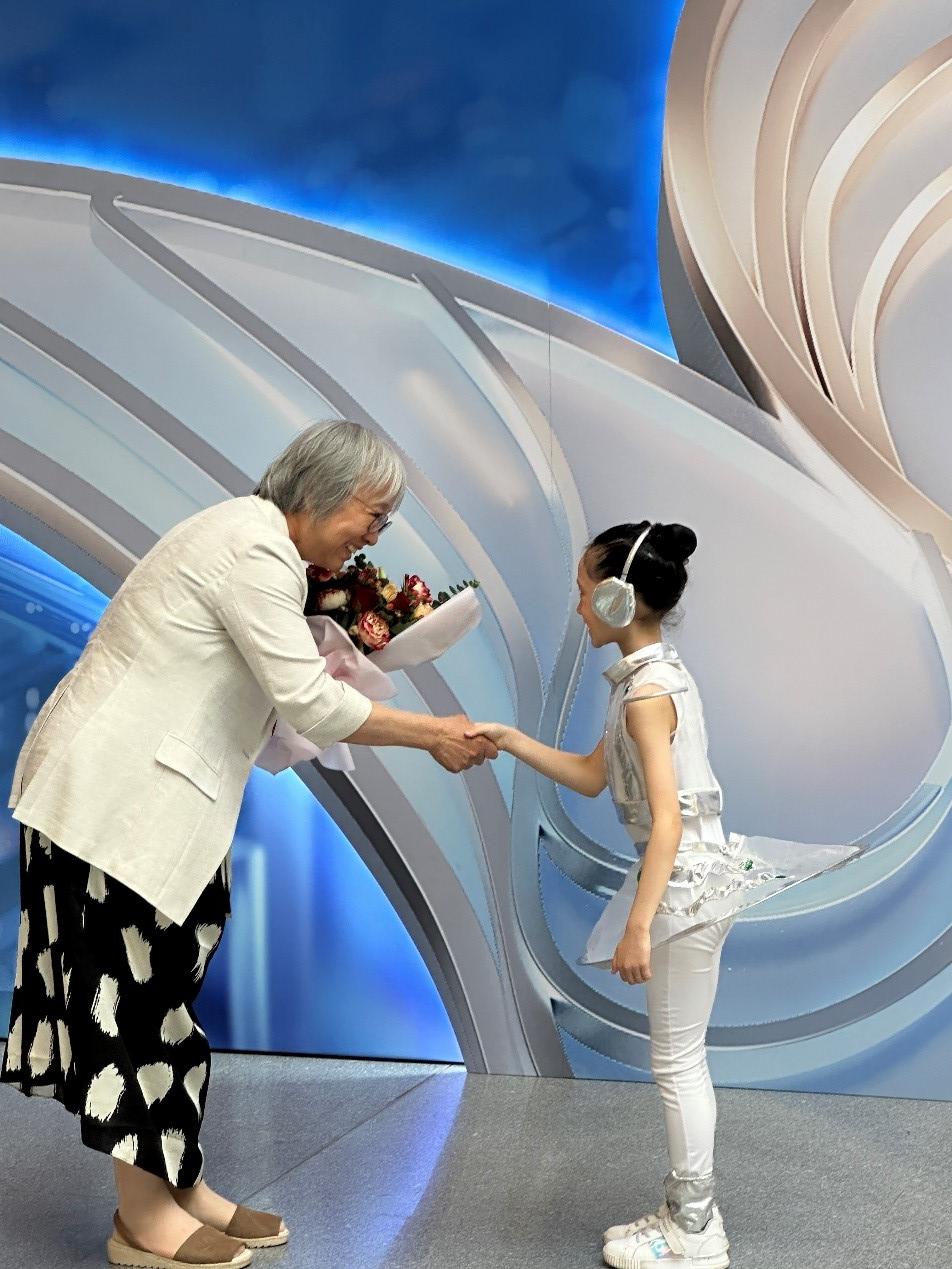
Academician Yuan Junying, who had just walked the red carpet, shook hands cordially with the children. Photo by Wu Yuewei, reporter of The Paper
Early in the morning on May 18, Hu Yixuan from Shanghai Yangpu Bilingual School got up and set off at 6:15 to rush to Zhangjiang Science Hall in Pudong.
That day was the first day of the 2024 Shanghai Science and Technology Festival, and the opening ceremony was to be held. She had to volunteer for the entire day.
"It's such a rare opportunity to see cutting-edge science and technology and meet scientists. Even if I have to go at 5 o'clock, I will be happy to do it."
Like a "carnival" or a gathering of new and old friends, the 2024 Shanghai Science and Technology Festival is very attractive.
In the air, the back cover of the white spaceship was opened, and a string of colorful balloons poured out. The cabin seemed to be flying up, and it seemed to be floating up. The picture was full of fantasy. The theme of this art installation at Zhangjiang Science Hall was "Future".
Equally gorgeous is the science art illustrations jointly presented by ShanghaiTech University, New York University Shanghai and other institutions. The strange graphics are extremely beautiful under the "blessing" of colors.
In addition, the metaverse "red carpet" show that uses new technologies to allow scientists to "walk into" their research results and interact with them is also quite cool.
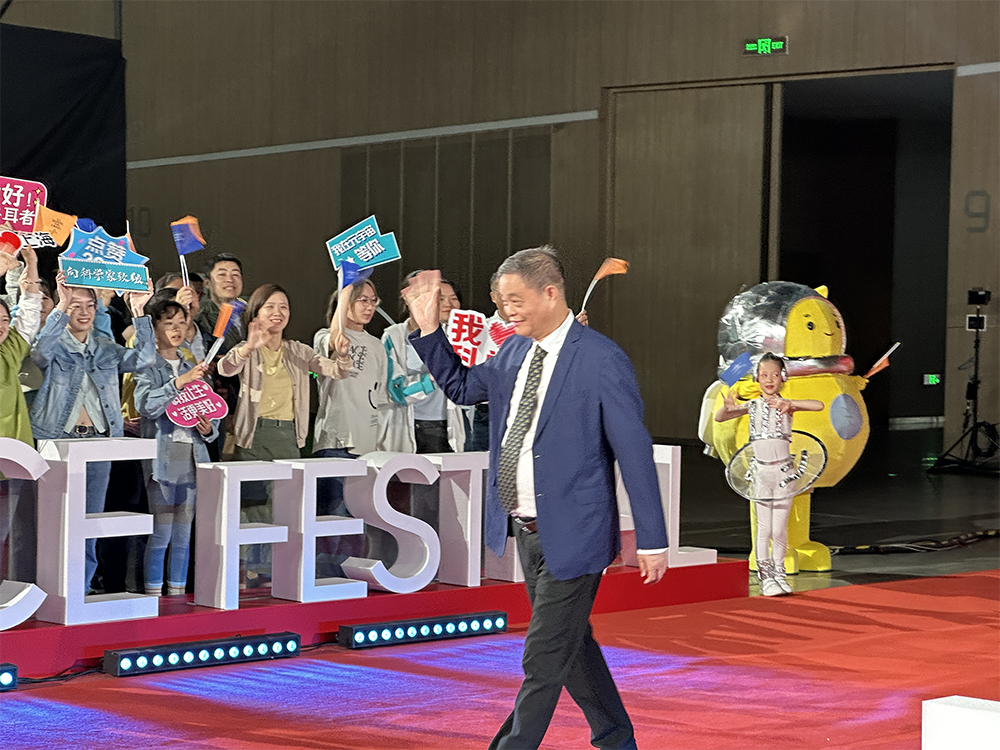
2024 Shanghai Science and Technology Festival. Gong Xingao, academician of the Chinese Academy of Sciences, professor of the Department of Physics at Fudan University, and director of the Key Laboratory of Computational Material Science of the Ministry of Education, walks the red carpet.
Even more impressive was the scene where Academician Yuan Junying, who had just walked the red carpet, bent down and shook hands cordially with the children.
The sincerity and efforts of every scientist, and every carefully designed link and activity, are all aimed at attracting more attention from young people or the public, hoping that people will have more yearning for science.
This is the "Swordsmanship at Mount Huashan".
In one day, three meetings were held, including seven lectures, three roundtable discussions and several speeches. This was May 18, the first day of the 2024 Shanghai Science and Technology Festival.
This technological feast will continue for two weeks, with a total of approximately 2,000 events.
"It was a fantasy in the past, it is difficult now, and it will be commonplace in the future." "Zhihuijun" Peng Zhihui succinctly described the development of science and technology.
Ji Xiaohua, founder and CEO of Guokr.com, said in a roundtable discussion that he believes that there are two cores to science or technology communication for teenagers. The first is to let children know where they will go and what they are capable of after learning and developing in this direction. Then, they will have a sense of purpose. Even if they encounter setbacks, they will not give up easily. The second is a multidisciplinary perspective. Many innovations and creations come from interdisciplinary disciplines and the excitement of multiple disciplines. Children are lucky to get multidisciplinary perspectives and methods during their growth stage.
Wu Jiarui, director of the Protein Facility at the Shanghai Advanced Research Institute of the Chinese Academy of Sciences and chairman of the Shanghai Science Writers Association, said that simply spreading scientific knowledge is not enough, especially for young people. Curiosity must be "spread".
The Shanghai Science and Technology Festival provides such an opportunity.
Dou Yifan, a student at Xuhui Middle School in Shanghai who was named Shanghai's "Tomorrow's Science Star", told The Paper that the Shanghai Science Festival is a good opportunity to broaden her horizons. She was shocked by the works generated by AI (artificial intelligence) at the opening ceremony. She also met many scientists who have made outstanding contributions and came into contact with many scientific fields that she had not known before. All of this has inspired her to continuously improve her scientific literacy and work harder and more rigorously in her future studies.
Hu Yixuan told The Paper that when she was working as an exhibition volunteer at the Shanghai Science and Technology Festival, she had to introduce some microscopic works. "When I first came across those works, I couldn't imagine how such beauty was captured. It wasn't until I carefully read the introduction of each work that I realized that the microscopic world that I had never paid attention to was so beautiful. Of course, if it weren't for the advanced technology today, I'm afraid that this beauty would not be discovered and recorded."
Ding Bo, deputy president of Shanghai Media Group, said in his speech that Shanghai Media Group will continue to give full play to the power of mainstream media, deepen the field of science and technology communication, work hard to promote cross-border integration, explore new communication models and methods, improve the quality and efficiency of health science popularization, and "silently nourish" the people's health.
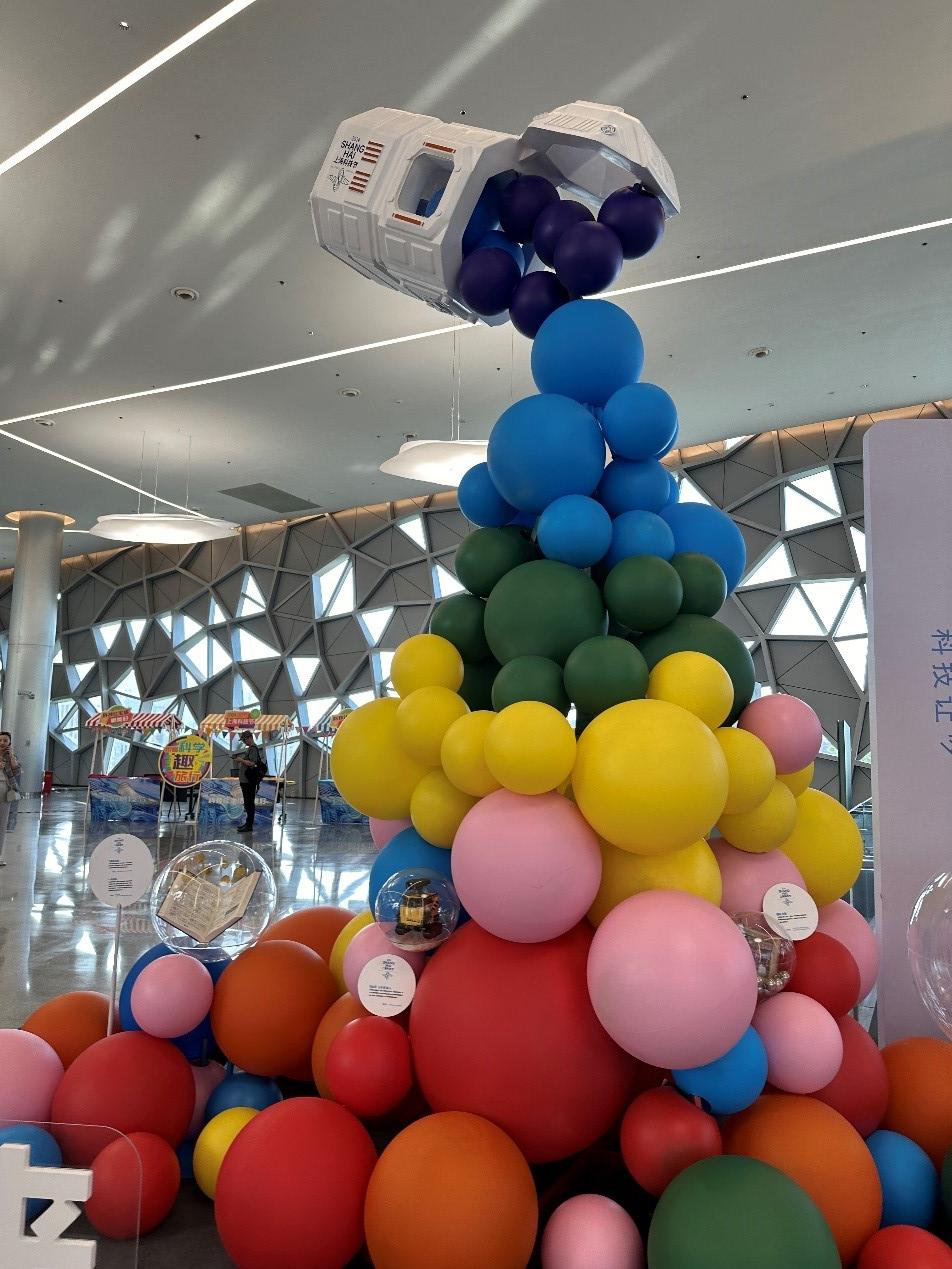
The "100+1 Future" art installation at the 2024 Shanghai Science and Technology Festival. Photo by Wu Yuewei, a reporter from The Paper
Academician Pu Muming, who paid out of his own pocket to teach science popularization: Encourage students to carry out original science popularization
The laboratories of the Center for Excellence in Brain Science and Intelligence Technology (formerly the Institute of Neuroscience) of the Chinese Academy of Sciences are located in Xuhui District and Songjiang District of Shanghai. Shi Yongyong, deputy director (in charge of work) of the center, delivered a keynote speech at the 3rd Shanghai Science and Technology Communication Conference.
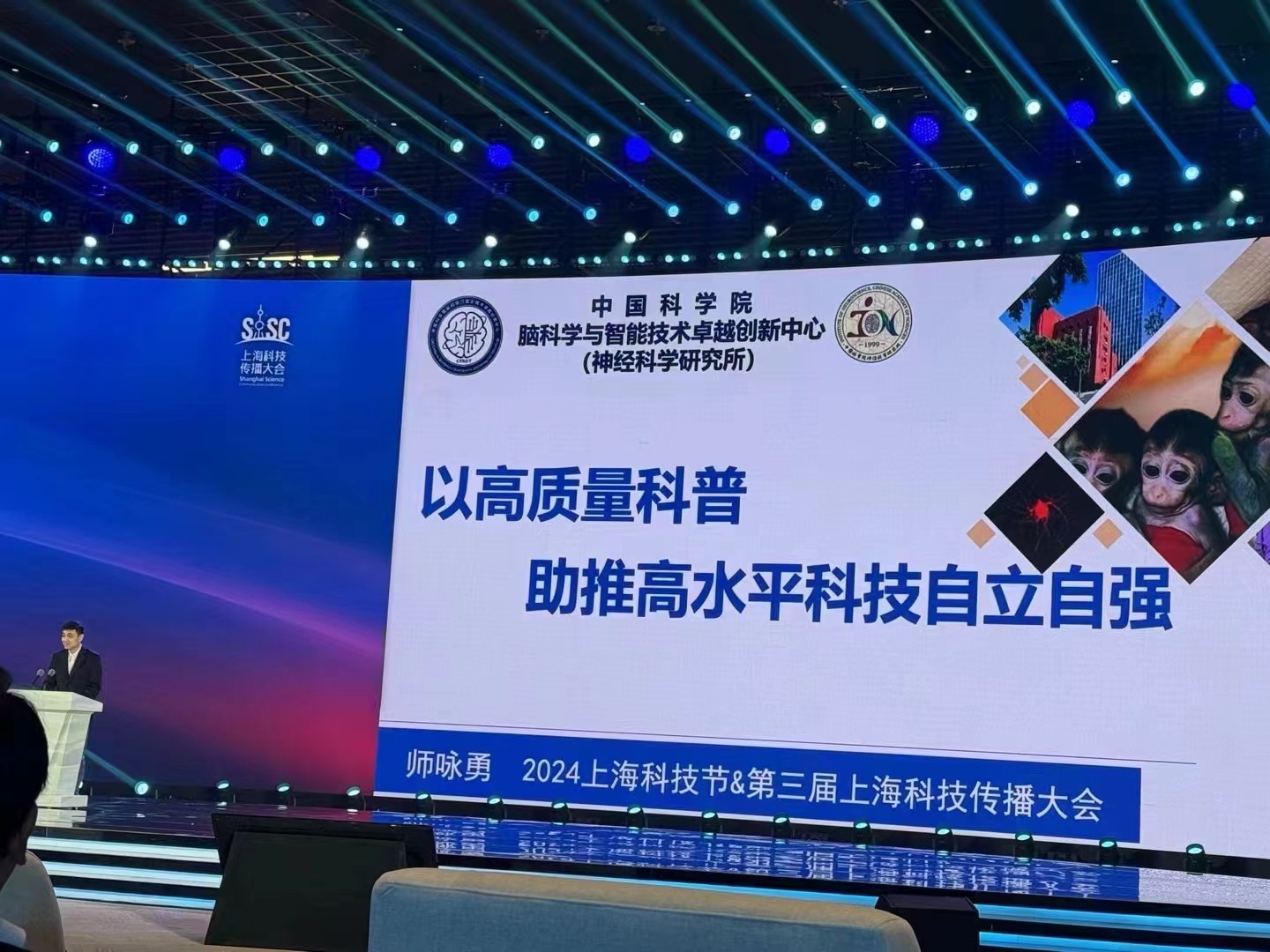
Shi Yongyong, deputy director (in charge of work) of the Center for Excellence in Brain Science and Intelligence Technology of the Chinese Academy of Sciences, delivered a keynote speech entitled "Promoting high-level scientific and technological self-reliance and self-improvement with high-quality popular science."
He said that since 2005, Poo Muming has paid more than 300,000 yuan out of his own pocket to lead colleagues from the Institute of Neuroscience to provide science education in areas where relevant educational resources are relatively lacking. Their science summer camps have been held in Ziyang, Sichuan, Ya'an, Sichuan, Qianshan, Anhui, Wuwei, Anhui, Dafeng, Jiangsu, Taojiang, Hunan, and Liuyang, Hunan, with more than 2,000 young people participating in related activities.
The summer camp courses started with basic knowledge such as physics, chemistry, and biology, and later focused on the field of neuroscience.
Because this is their best area and their most distinctive content. The brain is the most complex object in the universe. Although the brain functions seem simple, people still know very little about it. Researchers all over the world are trying to decipher the brain.
At present, under the influence and drive of Academician Poo Muming, teachers and students of the Center for Excellence in Brain Science and Intelligence Technology of the Chinese Academy of Sciences have developed more and more popular science videos, comics, books and popular science fairs, which are cutting-edge, authoritative, original and of high quality, presenting international cutting-edge scientific research results to the public, such as embryonic stem cell chimera monkeys.
Using bioelectric integrated recorders, they also developed a series of original science experiments, such as using clenched fists to summon "lightning" and brain wave confrontation, which attracted a large number of young people to experience.
At the 2024 Shanghai Science and Technology Festival, they also used VR glasses to display the whole-brain mesoscopic neural connection map. In manual operation, people can use the game controller to "move" the relevant brain areas.
In the future, they hope that more social forces will join the team of science and technology communication, mass-produce original brain science teaching aids, benefit more schools, and stimulate young people's interest in exploring the mysteries of the brain.
In addition, May 18-19 is the "Public Science Day" event of the Chinese Academy of Sciences. A series of research institutions including the Center for Excellence in Brain Science and Intelligence Technology will hold offline activities such as popular science lectures and small scientific experiments.
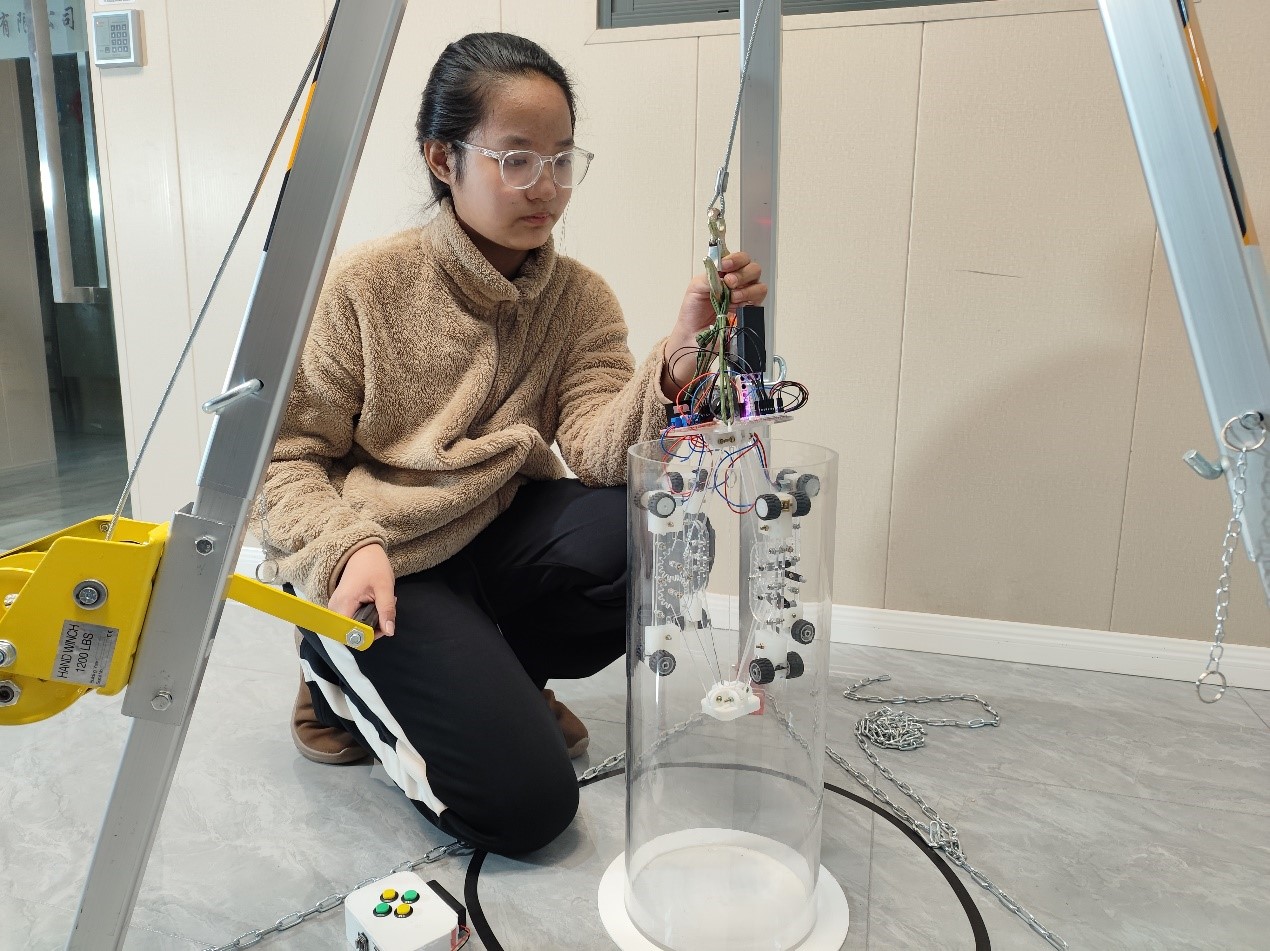
Dou Yifan, Shanghai's "Science and Technology Star of Tomorrow" and a student of Shanghai Xuhui Middle School.
Academician Ding Kuiling who participated in the micro-film: Shanghai Jiaotong University established a science and technology communication laboratory to improve internal strength and go global
Ding Kuiling, president of Shanghai Jiao Tong University and academician of the Chinese Academy of Sciences, mentioned an event in the past.
He said that as early as 30 years ago, Qian Xuesen, a graduate of Shanghai Jiaotong University (abbreviated as "SJTU"), a Chinese aerodynamicist and system scientist, suggested in a letter to then Vice Premier Zou Jiahua that a battery-powered car plan should be formulated. Today, 30 years later, Zeng Yuqun, an alumnus of Shanghai Jiaotong University, has led CATL to achieve a share of more than 36% of the global power battery market. In 2023, its global market share will be 36.8%. Zeng Yuqun said that the reason is that China's basic research on electrochemistry is well done and solid. The electrochemical papers published by Chinese scholars account for more than 40% of the world, especially those in high-level journals. The products are good enough because the talents cultivated are strong enough.
Ding Kuiling said that the specialization of science and technology communication is to practice internal skills and build a high-level and high-quality science and technology communication talent team. Shanghai Jiaotong University strives to establish the "three horses" for the training of science and technology communication talents: first, based on the School of Media and Communication, it has set up a secondary direction of science and technology communication under the first-level master of journalism and communication, and strives to create a dual-tutor training model of scientific tutor + thesis tutor; second, it has established a popular science intelligent communication research base and a science and technology communication laboratory to promote the formation of a highland of science and technology communication talents; third, based on the Yangtze River Delta Science and Technology Communication Alliance, it has gathered resources to form an academic highland.
Regarding the internationalization of science and technology communication, he believes that it is necessary to go out and bring in, so that the world can learn more about the booming China. In April 2023, with the support of Shanghai leaders and under the guidance of the Ministry of Science and Technology and the Shanghai Municipal Science and Technology Commission, Shanghai Jiao Tong University successfully won the right to host the 19th International Science and Technology Communication Association Biennial Conference in 2027, hoping to build a bridge for international science and technology and communication exchanges.
Regarding the popularization of science and technology communication, Ding Kuiling said that it is necessary to reach the public through multiple channels and methods. The popular science micro-film "Ubiquitous Fluorine: Organic Sister II" in which he participated was launched in 2024. He hopes to encourage more scholars to participate in popular science through short films. At the same time, he also participated in the review of popular science books such as "Getting Out of the Thinking Quagmire" and "Thinking Like a Genius", hoping to inspire young people's yearning for science. In addition, Shanghai Jiaotong University has also established a popular science expert group of more than 300 people led by academicians, and holds a popular science forum at sea every week, which has been held for 37 sessions.
Ding Kuiling said that no matter popularization, specialization or internationalization, the core is to attract more outstanding young people to devote themselves to science, to explore the unknown and serve the society as a lifelong goal, and to integrate personal dreams into the process of China's modernization. Let the power, surge and creativity of youth become the mighty force that drives the Chinese nation to move forward courageously and stand tall among the nations of the world.
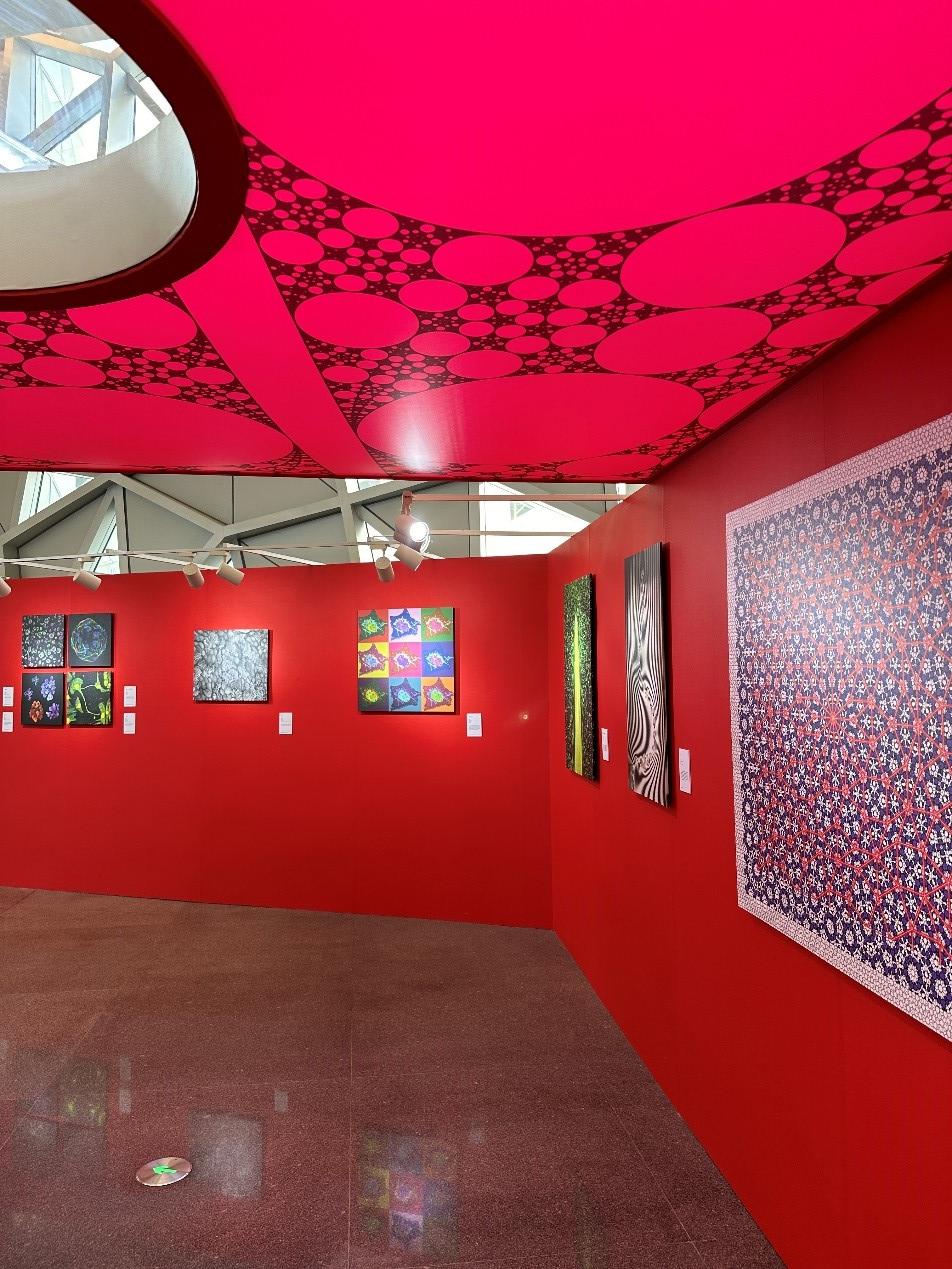
A collection of science and art jointly presented by ShanghaiTech University, New York University Shanghai and other institutions. Photo by Wu Yuewei, reporter of The Paper
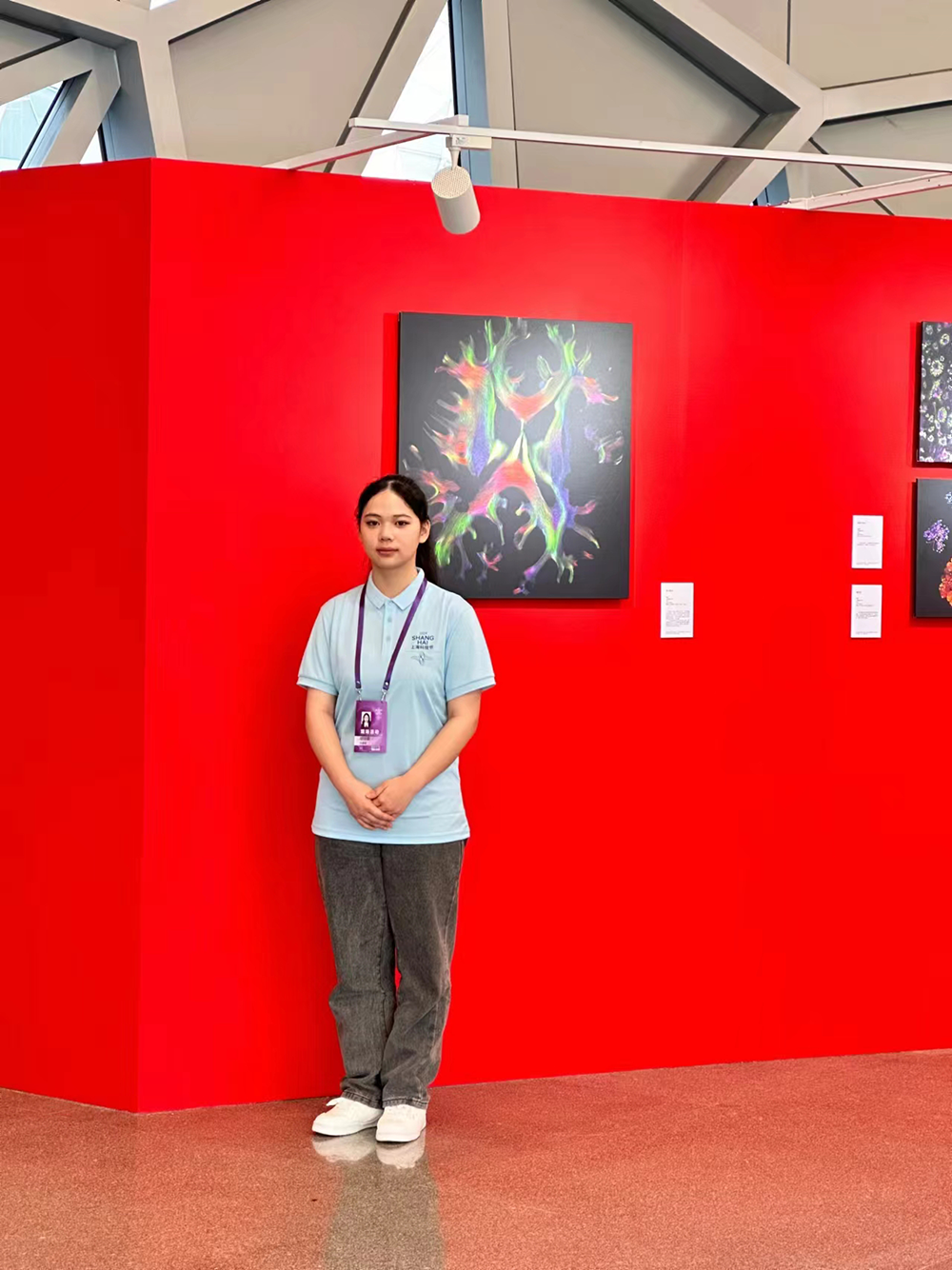
Hu Yixuan, volunteer of the 2024 Shanghai Science and Technology Festival.
Multi-pronged approach, "wild" Internet celebrities become regular
Wang Tong, deputy director of the Shanghai Health Promotion Committee Office and director of the Health Promotion Division of the Shanghai Municipal Health Commission, proposed in his report that a health science popularization system should be built to support the Healthy China strategy. Previously, the phenomenal health science popularization brand "Healthy Talk Show" was initiated by the Shanghai Municipal Health Commission.
Wang Tong said that it is necessary to establish a Shanghai health science resource library, build a Shanghai health promotion integrated media center, create a "central kitchen" to create an all-media publishing platform, and carry out all-media communication.
Xie Bin, Party Secretary of Shanghai Mental Health Center, said in his report that the hospital's image will be reshaped by popular science. The hospital cooperates with art galleries and theaters to carry out cultural creation to eliminate stigma. Among them, activities such as the "No. 600" Gallery, the "Blue Dream" Special Art Exhibition, and the "Megaphone" Schizophrenia Interactive Art Exhibition allow people to understand related diseases and eliminate discrimination and misunderstandings against patients. In the past three years, Shanghai Mental Health Center has received targeted support from social resources for more than 10 popular science projects, with a total funding of about 6 million yuan.
On the afternoon of May 18, 10 experts including Professor Qiu Zilong, Vice President of Songjiang Research Institute of Shanghai Jiao Tong University School of Medicine, Professor Zhang Jianwei, Vice Dean of School of Physical Science and Engineering of Tongji University, Professor Jiang Xuefeng of East China Normal University, Yang Jinshan, Researcher of Shanghai Institute of Ceramics, Chinese Academy of Sciences, and Professor Lu Baorong, Dean of Xide College of Fudan University were appointed as Vice Presidents for Science.
The results of the first batch of senior professional titles in science and technology communication in Shanghai have been announced. Representative figures include Chen Lei, whose online name is "Huanzi Ge", who was awarded as a researcher; Li Zhizhong, whose online name is "Pineapple", who was awarded as a researcher; and Peng Zhihui, whose online name is "Zhihui Jun", who was awarded as an associate researcher. During the 2024 Shanghai Science and Technology Festival, the first batch of senior professional titles in science and technology communication will be awarded, and the application for intermediate professional titles will be launched at the same time.
During the roundtable discussion, Li Zhizhong jokingly said that he was a "wild" internet celebrity who had become a regular celebrity and was no longer "unemployed". He said that he would continue to "squat down and do science popularization".

The "New Discoveries and Popular Science Book List" booth at the 2024 Shanghai Science and Technology Festival.
The "New Discovery Popular Science Book List" released at the Shanghai Science and Technology Festival is the first book list brand in China that specializes in reviewing popular science books. It was "born" in Shanghai in 2023. Five issues have been released so far, with a total of 100 books selected. Academicians Zhou Zhonghe, Qian Xuhong, Chu Junhao, Tang Tao, Ma Yugang, and Jing Yipeng served as judges for the book list.
At the opening ceremony of the Shanghai Science and Technology Festival, 100 selected books were displayed at the "Travel with Science Fun" market, and popular science books were given to citizens through interactive games.
During the round-table discussion, more and more guests suggested that relevant original popular science achievements, such as courses and movies, could be listed and traded on the Shanghai Technology Exchange to "transfuse blood" for popular science creation and achieve a virtuous circle.
In addition, some guests said that in the future, scientific research and popular science will definitely be deeply integrated. Among them, many doctors participating in the roundtable dialogue are also popular science experts or entrepreneurs. Professor Dong Jian, director of the Institute of Medical Popular Science of Fudan University and director of the Department of Orthopedics of Zhongshan Hospital Affiliated to Fudan University, led and starred in the micro-film "Bomb Disposal Expert on the Spine" and won the first prize in the audio and video category of the second Shanghai Health Popular Science Promotion and Selection Activity.
